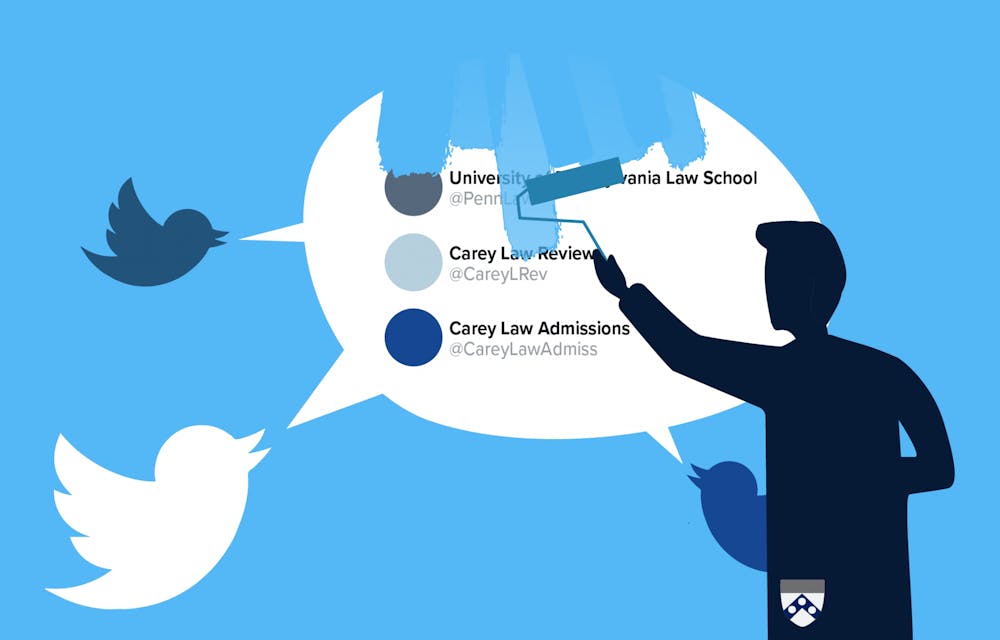When the news broke that Penn's law school would be renamed, the Carey Law School was quick to ditch its old Twitter handle of @PennLaw. Perhaps a little too quick.
A law student at Penn swiftly claimed the original @PennLaw Twitter handle and turned it into a parody account. In response, Penn administrators reported the account last week to Twitter, which later suspended that account and various others run by law students, including @CareyLRev and @CareyLawAdmiss.
Carey Law spokesperson Steven Barnes confirmed a law student took the @PennLaw handle after the school switched over to @careylawupenn.
"At the outset we did not know that students were holding these Penn Law and Carey Law accounts, and had we, we would have proceeded very differently," Barnes said.
"We regret the confusion this has caused and are updating our policies and practices to avoid any such situations in the future," he added.
Before it was deleted, one of the tweets by the @PennLaw account was, "$125 million? @tesswilkry's seltzer budget just went through the roof! #pennlaw," referring to Tess Wilkinson-Ryan, the Carey Law deputy dean for academic affairs.
@CareyLRev is a parody of @PennLRev, the official account for the Penn Law Review, while @CareyLawAdmiss mocks @PennLawAdmiss, the official account for Penn Law Admissions. Despite Penn's efforts to quash the profiles, multiple parody accounts still exist, such as @CareyLawReview and @PennLawSchool.
Carey Law is considering changing back to Penn Law, administrators announced on Nov. 11. More than 3,000 students and alumni have signed a petition demanding the law school change its short-form name from "Carey Law" back to "Penn Law," stating that employers will not recognize the new name.
RELATED:
Penn Law renamed ‘Carey Law School’ following record $125 million donation
Admin considers changing 'Carey Law' back to 'Penn Law' after student backlash
The Board of Trustees approved the name change to "University of Pennsylvania Carey Law School" on Nov. 8, after a $125 million donation by the W.P. Carey Foundation — the largest donation to any law school.

Karen and Henry Silverman Hall is one of the main Carey Law buildings, located on 34th and Sansom Streets.
Members of the Carey Law community agreed that these accounts were clearly made to mock Penn, and the students did not violate property rights.
“It was very clear that these were not official law school accounts nor were they making any effort to be official law school accounts," said Carey Law professor Polk Wagner, who specializes in intellectual property rights. "What they were doing was engaging in parody and making fun of the circumstances as a way of having social commentary.”
Wagner said Carey Law should encourage students to express their opinions, including using parody social media accounts to discuss the name change.
"They were not violating IP rights or impersonating, so I am confused and frankly disappointed that the law school would engage in that,” Wagner added.
"I think the law school is suppressing free speech by shutting [the parody accounts] down," third-year Carey Law student B.J. Courville said.
According to Twitter’s impersonation policy, “Accounts with similar usernames or that are similar in appearance (e.g., the same profile image) are not automatically in violation of the impersonation policy. In order to violate our impersonation policy, the account must portray another entity in a misleading or deceptive manner.”
Twitter users are allowed to create parody accounts as long as the bio and account name clearly indicates the user is not affiliated with the subject of the account, according to the policy.
Parody is a “clearly permissible” example of fair use which allows entities to use copyrights and trademarks of other entities, said Carey Law professor David Abrams, who also specializes in intellectual property.
“If you are using someone else’s copyright or trademark in order to make fun of them, given we believe strongly in the First Amendment in this country, we think that trumps the intellectual property rights in that area,” Abrams said.
Abrams, however, said he does not think this was an attempt by Carey Law to suppress students’ freedom of speech.
“I think there has probably been an oversight of giving up those Twitter handles,” Abrams said. “This was probably more of an attempt of correcting the oversight than suppressing student speech, I hope. I really hope.”









